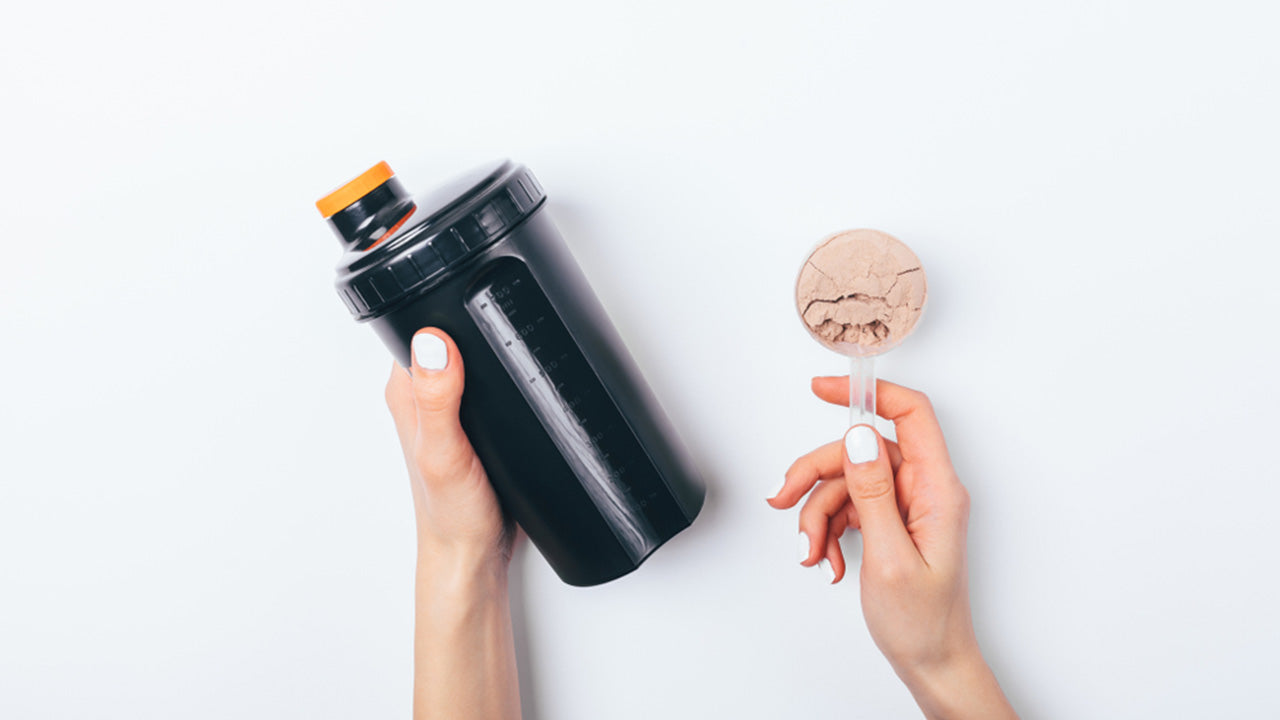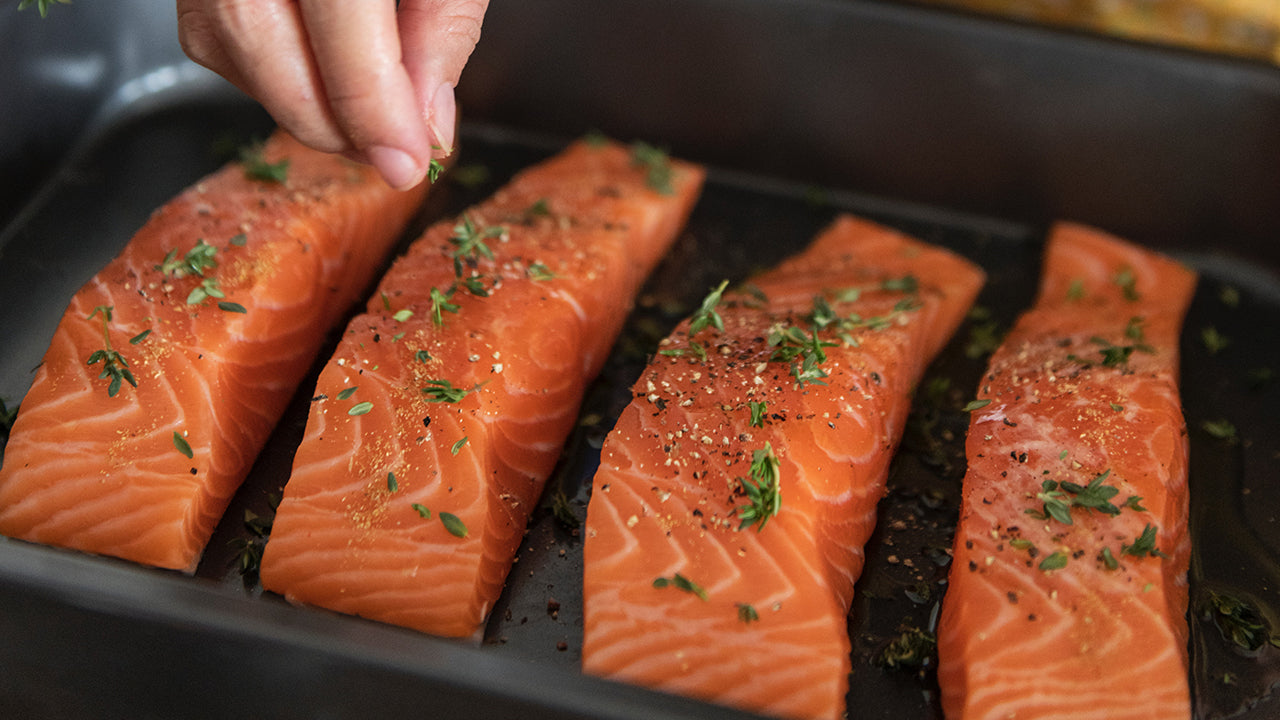When Is the Best Time to Take Protein?
 By: by Amino Science
By: by Amino Science

When taking protein supplements, people often wonder when exactly is the best time of day to consume them. Pre-workout? Post-workout? Is it okay to drink a protein shake before bed? Protein supplements can help people lose weight, build muscle, and recover from tissue damage due to injury or surgery. Because they're so effective, most people want to be sure they're utilizing protein the right way. So when is the best time to take protein? Short answer is: that depends on your health goals and the kinds of workouts you're doing. For the longer answer and more detail, read on.
The Different Types of Protein Supplements
Protein is a source of energy for the body, essential for muscle growth, repairing damaged tissue, and preventing certain infections and diseases. Normal dietary protein comes from foods like meats, eggs, fish, dairy, grains, legumes, and seeds. Though animal products contain the most amount of protein, vegetables are sources of protein too, a fact well-known by those living a vegetarian or vegan lifestyle. Of the most popular protein powders on the market in fact, a significant portion are plant-based.
Plant-based proteins include:
- Soy protein containing all nine essential amino acids.
- Rice protein, which is lower in the essential amino acid lysine.
- Pea protein, which has lower levels of the essential amino acid methionine and nonessential amino acid cysteine.
- Hemp protein, which is low in lysine but high in fiber, and omega-3 and omega-6 fatty acids, both of which are essential, meaning your body can't make them on its own, and needs to gain them from the foods you eat.
Dairy-based proteins include:
- Whey protein, which is absorbed relatively quickly and contains all nine essential amino acids.
- Casein protein from milk curds, also containing the essential amino acids, and with a slower digestion rate than whey (which is why people often take casein before they sleep, so it will digest throughout the night... more on that timing below).
Animal-based proteins include:
- Egg protein powder made from pure egg white protein.
- Creatine, which is not found in plants but can be synthetically created. Though it is an animal protein, depending on its origin source, it may nevertheless be possible for vegans to use creatine as a supplement.
These are among the most commonly known protein powders available to buy, but we here at the Amino Co. have also developed an essential amino acid (EAA) blend that isn't lacking or low on any of the amino acids required for protein synthesis and new muscle growth. It also blends free-form amino acids with whey protein and creatine, a nonessential protein that nevertheless has great value as a supplement. These forms of protein are used to help those who want to build muscle rapidly, and can even benefit those with muscle, neurological, or neuromuscular diseases.
The Varied Uses of Protein Supplementation
From muscle building to weight loss, here's a quick look at all that supplemental protein can do to benefit your body.
Exercise Performance and Recovery
Added protein has been shown to increase endurance during training and workouts, as well as reduce soreness and speed up post-workout recovery. The timing of your protein intake matters here, whether you're eating high-protein foods or taking supplements. Read on to learn about workout-specific timing recommendations.
Muscle Building
Muscles can only be built when you have the proper amount of amino acids for protein synthesis, and when you're consuming more protein than your body breaks down during workouts. Taking a protein supplement, especially one that contains all the necessary EAAs for muscle growth, can make a huge difference. Finding the right anabolic window, the period of time when the protein you take in will go directly to your muscles, is something the International Society of Sports Nutrition has done extensive research on, and we, too, will provide specific scientific reasoning below.
Muscle Loss Prevention
Muscle mass is lost not only during intensive workouts, but also naturally as we age. Each decade you live after the age of 30 brings with it a higher risk of losing muscle (anywhere between 3-8% per decade). Proper protein intake is not only valuable to athletes, bodybuilders, and anyone who works out regularly, but it's also important for each and every one of us as we age. Most Americans reserve their protein more for dinner than breakfast (3 times the amount on average is the difference between the two meals), and could use a supplemental boost of protein first thing in the morning to shore up their protein stores and help prevent the loss of muscle mass due to aging.
Fat Loss Facilitation
Protein is filling enough to help curb hunger pangs and chemically contributes to appetite suppression by reducing the "hunger hormone" ghrelin. A high-protein diet raises your metabolism and increases levels of appetite-reducing hormones like peptide YY (PYY) and glucagon-like peptide-1 (GLP-1). More satiety means fewer calories consumed throughout the day, which quickly leads to safe, maintainable weight loss and the reduction of dangerous body fat.
The Enduring Power of Protein
Popular because they're convenient and effective, protein powders and supplements are here to stay and can offer you a wide variety of options, from self-mix formulas and powders to ready-to-drink protein shakes. If you've got your preferred protein supplement ready to go, then it's time to wonder: when should you drink protein?
The Best Time to Take Protein Depending on Your Workout
Depending on your goals and activities, there are recommended times to take protein for the greatest effectiveness for your energy levels and muscle-building needs. Here are specific recommendations based on different types of workout activity.

Aerobic/Cardiovascular Exercise
Best time to take protein: Pre-workout and post-workout
The amino acid leucine is one of the three branched-chain amino acids (BCAAs), and it promotes muscle recovery after workouts. Not only that, it activates protein synthesis, prompting new muscle to be built. One might think that due to leucine's ability to boost endurance and stamina, one should take a BCAA supplement before a workout, but the science contradicts that idea. Not only are BCAAs only three of the nine essential amino acids needed to construct new muscle, leucine and the other BCAAs (isoleucine and valine) experience oxidative degradation during aerobic activity.
BCAAs Are Insufficient Pre-Workout
Adding these limited amino acids before your workout, especially in the unbalanced form of BCAAs instead of a complete EAA formula, means that a greater percentage will be oxidized and used for energy instead of muscle building. Your body does not want to be out of balance, so a sudden overabundance of a few amino acids will cause the body to clean up and reduce them in order to maintain equilibrium.
Rather than risk burning off the protein you put in because your body is only looking for energy sources, it's better to take a full measure of EAAs within the hour after your aerobic workout, when your body is looking for supplies to rebuild. Leucine will be there to prompt muscle protein synthesis, and the rest of the essential amino acids will all be included in the ideal ratio for generating new muscle growth.
EAAs Are Effective Pre- and Post-Workout
That being said, taking a complete amino acid protein supplement (we recommend Perform) before an aerobic cardiovascular workout (like a high-intensity interval training or HIIT class), not only provides the necessary ingredients for muscle building, but also helps fight fatigue in a way that only taking BCAAs can't, by fueling your body with the amino acids that help produce dopamine and serotonin in the brain.
Whether you're walking, cycling, running stairs, or jumping rope, start by taking your EAA supplement 30 minutes before your workout session. The biggest benefit comes when you take your EAA supplement within an hour after your workout, when your blood flow is strong and active. Not only will the amino acids rush in to replace damaged muscle fibers with new muscle, EAAs can also help calm unnecessary inflammation. That will help quicken your recovery, allowing you to feel only the good side effects of working out, like increased energy and light euphoria, instead of soreness and fatigue.
Resistance Exercise
Best time to take protein: Pre-workout, during, and post-workout
Research has shown that EAAs given 30 minutes before a resistance exercise workout prompt muscle protein synthesis much more effectively than consuming EAAs afterwards does. Taking a protein supplement before this type of workout helps prevent the breakdown of muscle protein during the activity, and also increases blood flow to the muscles, thus getting the amino acids quickly into the muscle where they're needed.
Consuming EAAs after a resistance workout is not harmful by any means, as that method, too, will prompt the stimulation of muscle protein synthesis, but it's not ideal to leave the consumption of EAAs until after your resistance training is complete. Our recommendation is to first and foremost take a complete protein supplement before a resistance workout, and if possible take them throughout and/or after as well to get the most benefit.
Bodybuilding
Best time to take protein: Pre- and post-workout, and also before bed.
Immediately before and after a weight-lifting workout, we recommend that you take 15 grams of EAAs each. An EAA supplement has been shown to have a faster effect on muscle protein synthesis than either whey or casein protein alone. However, our Amino Co. blend of free-form EAAs with whey and creatine support ensures that you get a fast dose of EAAs and that the EAAs from whey will digest more slowly as you work out, offering a steady supply to help prevent muscle breakdown. Creatine helps prevent catabolism by supplying faster energy than your body can naturally generate from muscle cell mitochondria. This means more energy for more reps, which ultimately means more work put in and more muscle gained.
An hour after your post-workout dose of EAAs, we recommend another 15-gram dose. On off days, continue taking these same doses, measured between meals instead of surrounding your workout. Lastly, it's also recommended you take another 15-gram dose before bed to keep your muscles fed as you sleep and to help prevent muscle breakdown as much as possible. You work hard to gain your muscles, and we encourage you to protect those gains at every opportunity. Set your alarm to take one more dose around 4 am if you know you won't have a problem falling back to sleep, that way your muscles never go hungry for fuel.
It should be noted here that bodybuilders aren't the only ones who benefit from taking extra protein before bed. One study of 16 elderly men showed that those who consumed casein protein (which digests slowly) before bed had increased muscle growth over those who took a placebo, despite being less active individuals. When you're sleeping, it's the protein that counts, and not the activity.
Is There Any Downside to Taking Protein Supplements?
The majority of scientific studies into how our bodies process high amounts of protein show that you can safely consume plenty of protein without risk of harmful side effects. Unless your doctor advises against protein supplements or you have a known kidney issue like rhabdomyolysis, there is no need to worry about excessive protein intake; merely take your products as recommended and spread them throughout your day.
Timing Is Everything
At the end of the day, it's true that people who work out need more protein, but even those with a less active lifestyle benefit from consuming extra protein for strength, for maintaining healthy weight levels, and for preventing the loss of muscle mass we all experience as we age.
Make a protein shake for breakfast, have another to curb your appetite between meals, and make another as a beneficial treat before bed. Know that the more regularly you take in balanced forms of protein like Amino Co.'s complete EAA blend, the more good you can do for your body. Whether you're working out or not, upping your daily protein intake is safe and smart. Bulk up, slim down, and stay strong with protein!

Up to 25% off Amino
Shop NowTAGS: supplements
Join the Community
Comments (0)
Most Craveable Recipes




 833-264-6620
833-264-6620



















